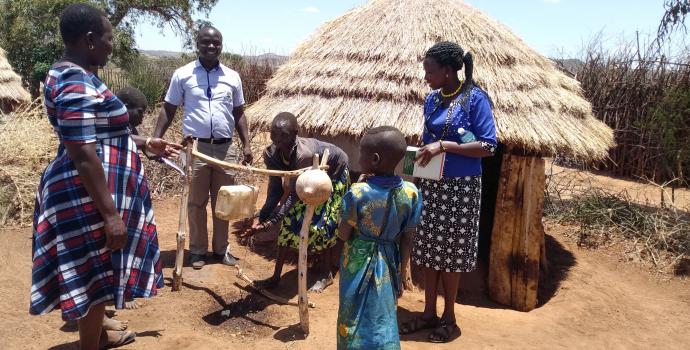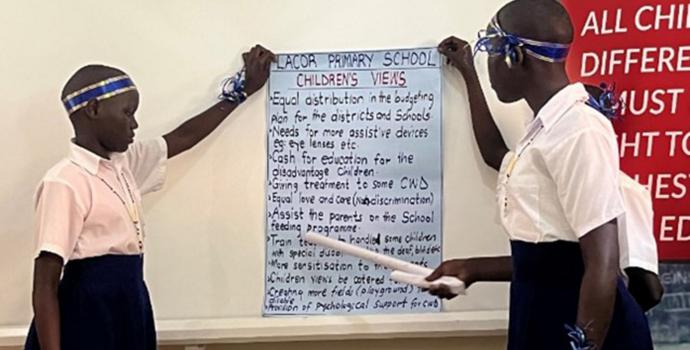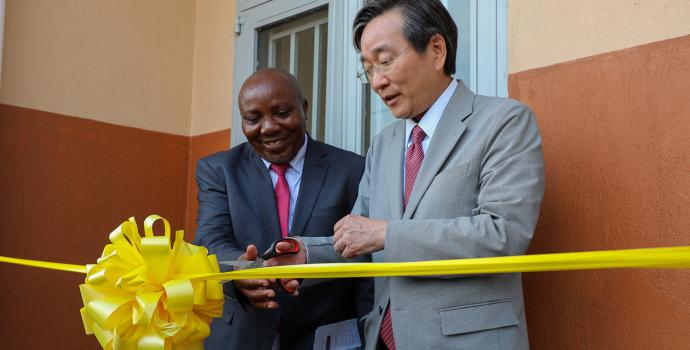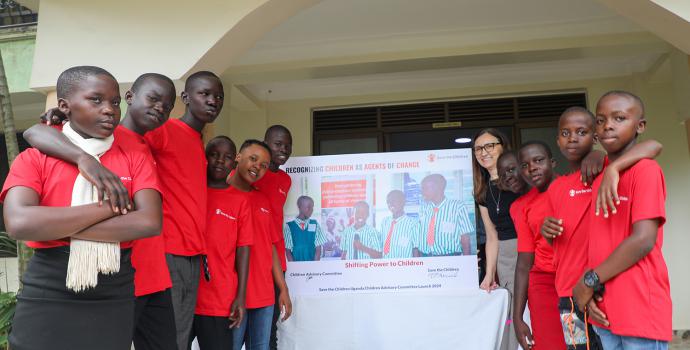Reducing diarrhoea and improving sanitation in Karamoja

This article was originally published by the New Vision newspaper for World Water Day
For as long as she can remember, from when she was a little girl until she got married and became a mother of six, the big challenge in Pangath Lucia’s life was her struggle to cope with the harmful effects of open defecation.
Growing up in Lokesenyak village, Kalapata sub county, she spent most of her time fighting diarrhoea and frequent stomach-aches amongst her children. The diseases were transmitted by flies carrying faecal matter to the food during meal hours. As a result, Lucia spent lots of her meagre cash each month for treatment and care for the sick children.
However, in 2017, Save the Children in collaboration with Mercy Corps responded to the plight of the communities in Karamoja by setting up WASH (water, sanitation and hygiene) interventions under the inception of the Apolou activity, which literally means “growth”.
As a result, diarrhoea among young children in these Karamoja communities has greatly reduced.
Apolou is a five-year USAID-supported Food for Peace initiative with the goal of improving the food and nutrition security of 310,000 vulnerable people in Kaabong, Kotido, Moroto, and Amudat districts of Karamoja.
It has four sectors: Promoting inclusive and effective governance; Improving maternal child health and nutrition; reducing incidences of WASH-related diseases; and improving livelihoods. These are supported by promoting social and behavior change, gender equality and women’s empowerment, and resilience.
The activity is implemented by a consortium of Mercy Corps (as the lead), Save the Children, Whave, Tufts University’s Feinstein International Center, and three local organizations: KAPDA, Nakare Rural Women Activists, and RiamRiam Civil Society Network.
Apolou also works with households, community leaders, the Ministry of Karamoja Affairs and Government of Uganda, private sector and other development actors to address underlying causes of chronic food and nutrition insecurity, while building a foundation for community and household resilience.
Apolou’s WASH intervention, implemented by Save the Children and Whave, improves infrastructure and promotes key behaviour and practices, using innovative approaches such as Community-led total sanitation; the ‘clean household’ approach; and Sanitation Marketing, using commercial marketing strategies to increase community engagement.
To improve water access in communities, boreholes are rehabilitated and the project works with the private sector to promote preventive maintenance to increase their functionality. Apolou has also built latrines, handwashing stations and other facilities.
Today, diarrhoea cases have greatly reduced; and poor hygiene and sanitation practices are almost history among the selected villages. All 54 households in Lokesenyak village now utilise pit-latrines and practice proper handwashing.
According to Apolou activity coordinator, John Obadiah Lomongin, households have been freed of the huge burden of WASH-related diseases. He said; “Before, there was one latrine available in the manyatta/settlement, which has about 15 households. This latrine belonged to a village health team and community members were easing themselves in the bushes”.
With reduced hospital visits, mothers can now save their little earnings from local brew and firewood sales, which has enhanced household incomes.
“Households are now trying to ensure that there is sustainability after the project expires,” Lomongin stressed, adding that sanitation and hygiene education programmes are meant to teach good practices to the community.
Martha Loyolo, one of Pangath’s neighbours in the village, said her family used to make several trips to the nearby bushes for the sake of answering nature’s call, and suffered most during the rainy season. However, the frequent diarrhoeal episodes in the family are no more.
“Life in my family has changed and returned to normal after the latrine was constructed. My daughters who would carry their young brothers and sisters to the health centres are now stable in school,” said Loyolo
“My family members have learnt how to use the latrines, wash hands after every visit, and ensure the place is clean,” she said with a beaming face.
She appreciates the intervention by Apolou, saying lives have been changed by the activity.
The Kaabong District Chairperson, Mark Abuku, said decades of armed rustling and conflict derailed the health initiatives of the communities in the sub region. “We would not be this bad if were politically and socially stable in the past,” he said. Abuku said the Karimojong knew what to do but the chronic conflict pushed them to the wall, forcing them to take directions that they felt were appropriate amidst insecurity.
He commends the Apolou consortium of partners for the timely interventions into the basics of hygiene and sanitation.
The Sub County Chief Kalapata, Evaline Nakwang, says ever since latrines were constructed, households have embraced using them. “We need more interventions so as to jump onto the national level,” she said, adding that the latrine coverage in Kaabong stands at 32 percent against the national at 79 percent. “The incidences of diarrhoea have greatly reduced amongst the communities,” she noted.
Nakwang appreciated the development partners for improving the lives of the community saying the activity should also extend to other neighbouring sub counties. She added that latrines now show the impact of ideal villages within the district, a lesson to others who are not within Apolou catchment areas.
Nakwang is optimistic that sanitation and hygiene efforts will have a huge bearing on the lives of people amongst villages in the sub county.
The LC1 chairperson of Lokesenyak village, Lochoro Koobu, said Apolou will change the fortune of various households.




